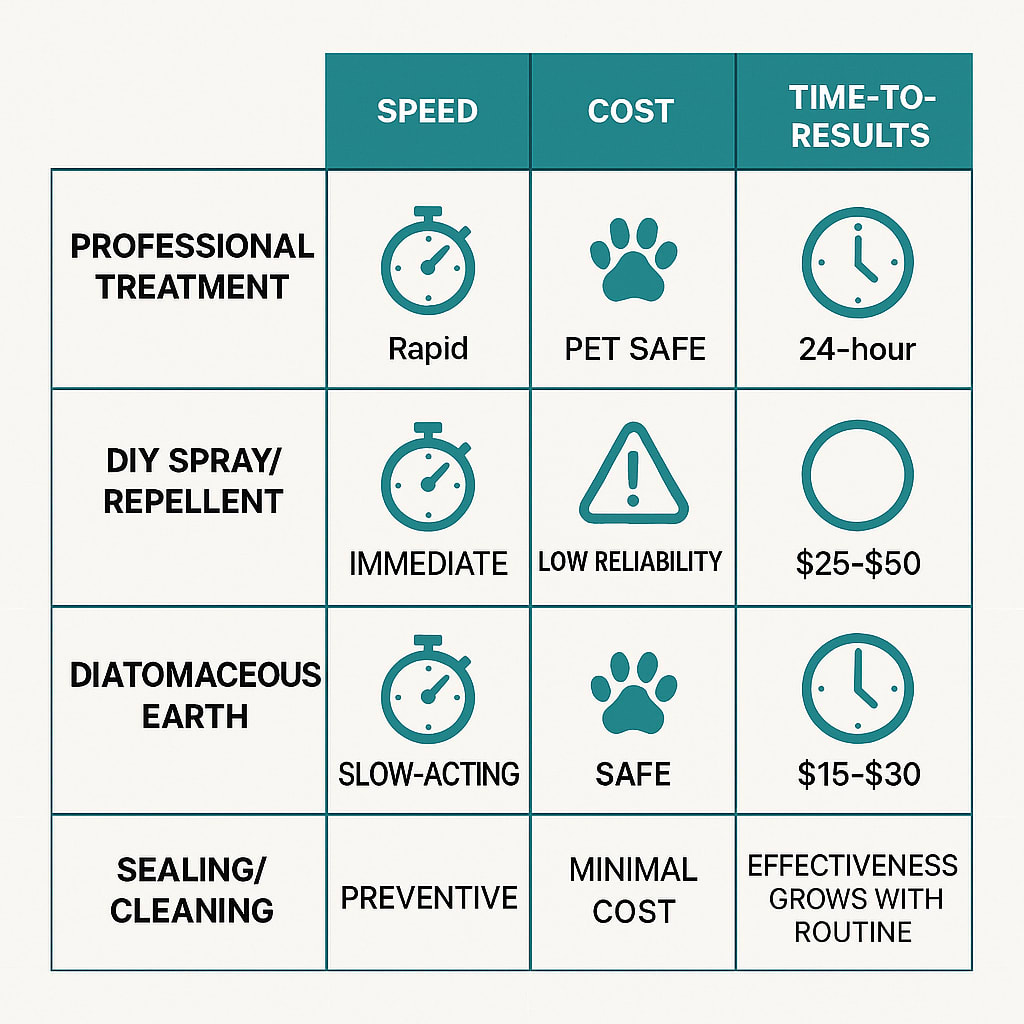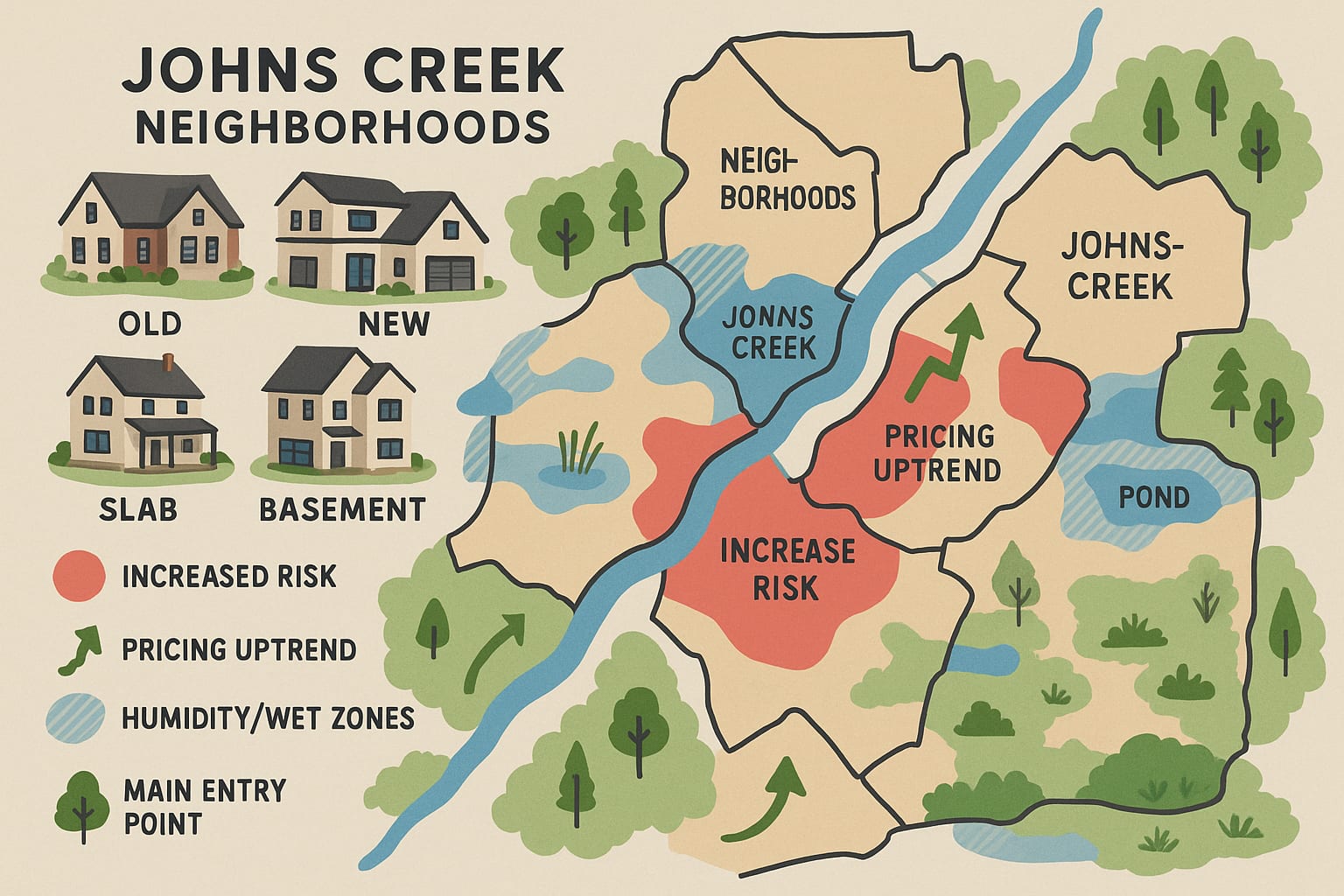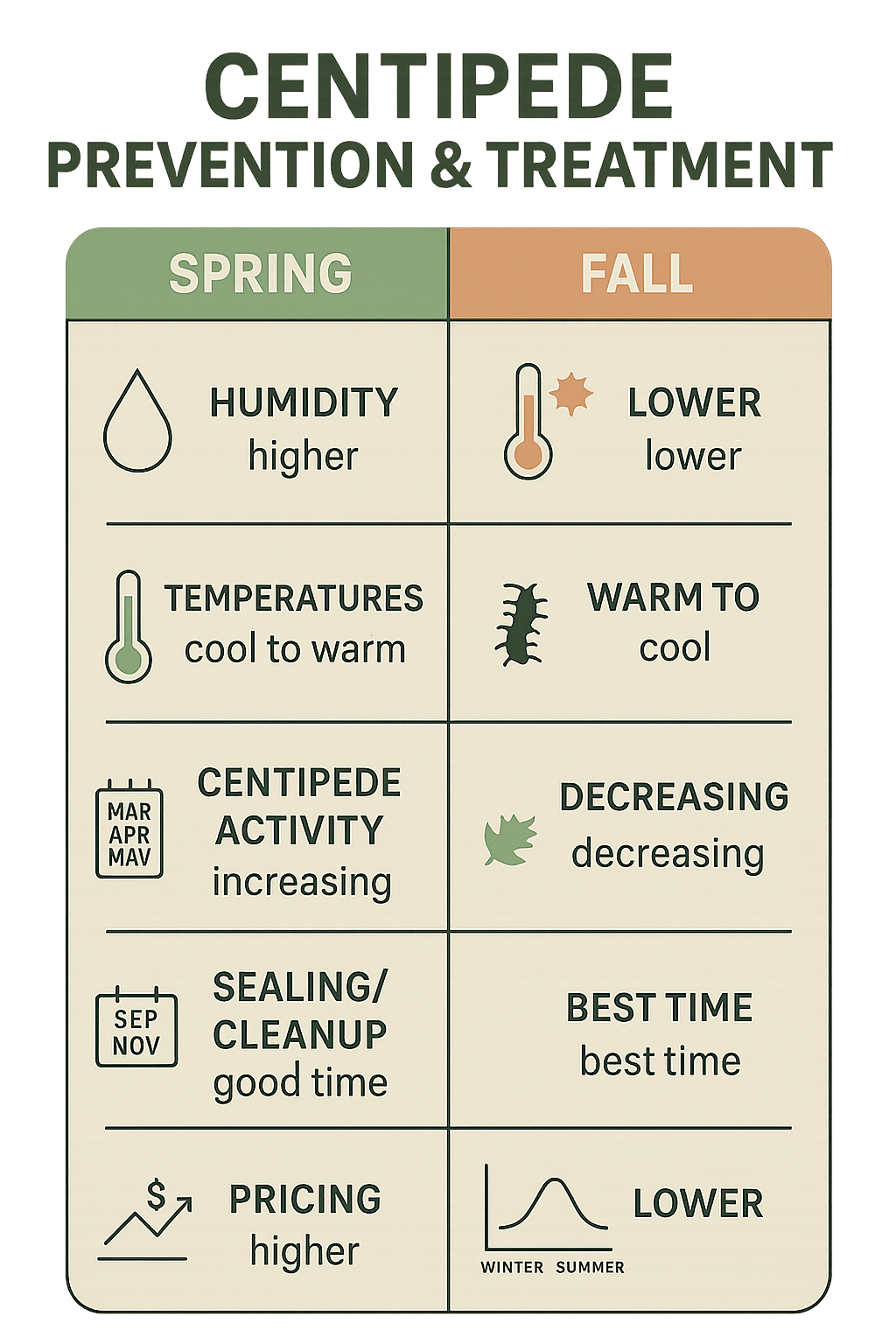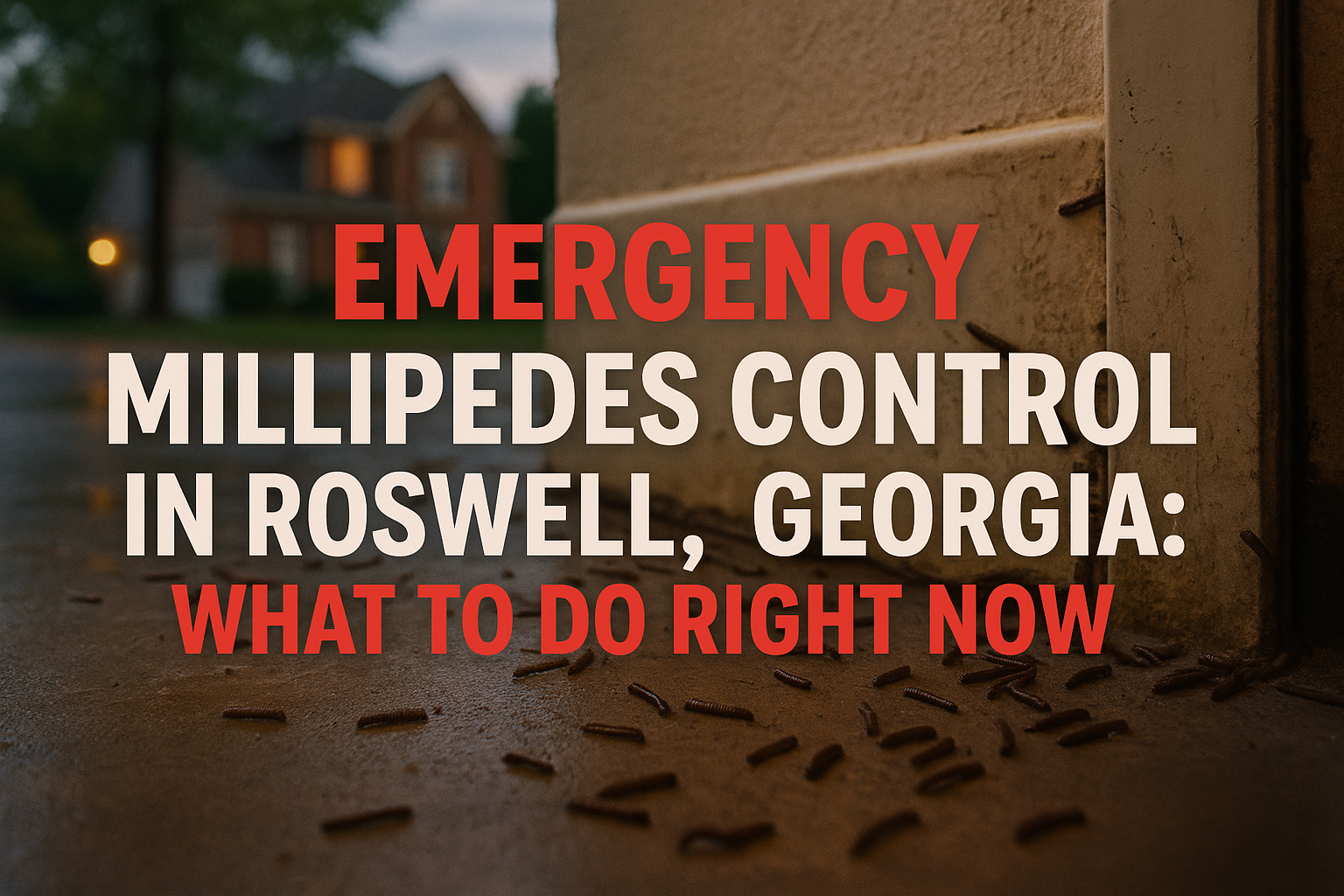Centipede Trouble in Johns Creek? Act Fast Before It Gets Worse
If you’ve ever spotted a centipede scurrying across your bathroom floor or hiding out in the basement, you know it’s enough to make anyone’s skin crawl. And here in Johns Creek, emergency centipede control isn’t just a random service—it’s a real need for many neighborhoods, especially when the Georgia humidity kicks up in spring and summer.
Areas like Newtown, Medlock Bridge, and DoubleGate see more centipede activity, thanks to older homes and lush, mature greenery right outside our back doors. With all the moisture Georgia is famous for and the natural clutter these neighborhoods offer, centipedes find plenty of perfect hiding spots—inside and out. But while these pests don’t usually bite or cause direct harm, their presence means something else in your house is attracting them. Think higher-than-usual humidity, leaky pipes, or an unnoticed buffet of other insects centipedes love to chase down.
Ignoring even a single centipede sighting is risky—they multiply fast, and once they settle in, getting rid of them without professional help can feel impossible. Every extra day you wait, the more likely it is they’ll be popping up where you least want to see them: bedrooms, kid’s playrooms, or even right next to your pet’s food bowl. That’s why calling in an expert as soon as possible is key. Emergency centipede control services in Johns Creek usually run from $150 to $350, depending on how bad things have gotten and what treatment works best for your place. The upside? You’re looking at nearly instant peace of mind—most reputable local pros offer 24-hour turnaround, and treatments are safe around kids, pets, and your favorite plants.
So if you’re finding centipedes at home, don’t just wish them away. Quick action can save you stress, money, and the headache of a bigger infestation tomorrow. Up next, we’ll break down your best treatment options, factors that impact cost, and simple ways you can keep your Johns Creek home centipede-free all year. Ready to kick centipedes out for good? Let’s explore your choices in the next section.
What Impacts the Cost of Emergency Centipede Control?
If you’re calling for emergency centipede removal in your Johns Creek home, you’re probably already thinking about what it might cost. There’s no one-size-fits-all answer, but here’s exactly what local homeowners like you can expect, so there are no surprises.
- Your Home’s Size & Layout: Bigger homes naturally take more time and product to fully treat. If you’ve got a basement, multiple levels, or quirky corners, professionals need to cover a lot more ground. Little ranch homes are usually less expensive, while sprawling houses in neighborhoods like St. Ives or Sugar Mill can bump up the price because of sheer square footage or unique architecture.
- How Bad’s the Infestation? Seeing one centipede here and there? That’s typically a quick job. But if you’re seeing several, or they’re turning up in different rooms, it means they’ve moved in—and that’s where things get serious. Heavy infestations take more product, more time, and more follow-up, which means a higher fee.
- Moisture & Prey Problems: Centipedes love damp spots and plenty of food (other bugs). If pros spot signs of water leaks, high humidity, or a general bug buffet in your house, they’ll have to address those, too. Tackling the root of the problem keeps centipedes from coming back, but it does add to the cost.
- The Treatment Approach: Fast-acting and pet-safe options are the go-to for emergency visits, especially if you need peace of mind right now. While they’re a touch pricier than traditional sprays, most families think it’s worth it for the safety and speed. Plus, these treatments mean you don’t need to leave the house for long—or at all.
- The Neighborhood Factor: Some spots in Johns Creek, like River Farm’s older homes, need extra care, or may be harder to access for a service vehicle. Special handling for tricky crawl spaces or preserving historic finishes can nudge costs higher than modern neighborhoods built for easy maintenance.
For context, a basic emergency centipede call starts around $150. If things are out of hand—or if you want to pair centipede treatment with a general pest control sweep—costs can hit $350 or more. Think of it as the difference between putting out a campfire and tackling a five-alarm blaze. Either way, you want it handled fast, and done right.
Bottom line? Ask your provider for a clear estimate after a quick inspection. Reputable pros explain what you’re paying for, and adjust to your home’s unique needs. A little transparency now saves headaches (and surprises) later on.
What Impacts the Cost of Emergency Centipede Control?
If you’re calling for emergency centipede control or removal in your Johns Creek home, you’re probably already thinking about what it might cost. There’s no one-size-fits-all answer, but here’s exactly what local homeowners like you can expect, so there are no surprises.
- Your Home’s Size & Layout: Bigger homes naturally take more time and product to fully treat. If you’ve got a basement, multiple levels, or quirky corners, professionals need to cover a lot more ground. Little ranch homes are usually less expensive, while sprawling houses in neighborhoods like St. Ives or Sugar Mill can bump up the price because of sheer square footage or unique architecture.
- How Bad’s the Infestation? Seeing one centipede here and there? That’s typically a quick job. But if you’re seeing several, or they’re turning up in different rooms, it means they’ve moved in—and that’s where things get serious. Heavy infestations take more product, more time, and more follow-up, which means a higher fee.
- Moisture & Prey Problems: Centipedes love damp spots and plenty of food (other bugs). If pros spot signs of water leaks, high humidity, or a general bug buffet in your house, they’ll have to address those, too. Tackling the root of the problem keeps centipedes from coming back, but it does add to the cost.
- The Treatment Approach: Fast-acting and pet-safe options are the go-to for emergency visits, especially if you need peace of mind right now. While they’re a touch pricier than traditional sprays, most families think it’s worth it for the safety and speed. Plus, these treatments mean you don’t need to leave the house for long—or at all.
- The Neighborhood Factor: Some spots in Johns Creek, like River Farm’s older homes, need extra care, or may be harder to access for a service vehicle. Special handling for tricky crawl spaces or preserving historic finishes can nudge costs higher than modern neighborhoods built for easy maintenance.
For context, a basic emergency centipede control call starts around $150. If things are out of hand—or if you want to pair centipede treatment with a general pest control sweep—costs can hit $350 or more. Think of it as the difference between putting out a campfire and tackling a five-alarm blaze. Either way, you want it handled fast, and done right.
Bottom line? Ask your provider for a clear estimate after a quick inspection. Reputable pros explain what you’re paying for, and adjust to your home’s unique needs. A little transparency now saves headaches (and surprises) later on—especially when it comes to emergency centipede control.
Why Centipedes Love Johns Creek Homes (and What That Means for You)
Living here in Johns Creek means you get to enjoy the beauty of wooded neighborhoods, big back yards, and that unmistakable Georgia greenery. But all those things also make our local homes a magnet for centipedes—especially when the heat and humidity kick up during spring and summer.
If your house has an older foundation, unfinished basement, or uses a lot of stone and wood, you might as well roll out the welcome mat. Those features tend to hold onto moisture and offer endless hiding spots. Centipedes are always hunting for damp, dark places, so a little bit of missed caulk or a loose window frame is all they need to invite themselves in.
Neighborhoods with dense landscaping—think Ocee or Abbotts Bridge—see even more centipede action. Heavy vegetation, mulch beds, and thick garden borders give these critters somewhere safe to nest and breed before sneaking indoors. Larger lots with gardens or homes that back up to wooded areas are going to need extra attention, both outside and inside, to really keep centipedes at bay.
- Climate: High humidity and frequent rain (especially April through September) send centipede populations soaring.
- Home Design: Unfinished basements, crawl spaces, and natural materials all provide more points of entry.
- Landscaping: Thick mulch, gardens, and wooded edges give centipedes year-round food and shelter.
- Secondary Pest Issues: Got roaches or spiders? Centipedes follow their food, which means one problem often leads to another.
- Repairs & Costs: If your home needs sealing, drainage fixes, or treatment for multiple pests, expect more time and higher costs for a truly effective solution.
No two Johns Creek homes are identical, and the right centipede treatment plan needs to reflect that. The best pros size up your property’s design, location, and the season before building a strategy. That’s how you get control over the situation—whether you’ve got a brand-new build or an old farmhouse on the outskirts. Local expertise makes all the difference when it comes to total peace of mind in centipede season.
Simple Ways to Keep Centipedes Out For Good
If you’re tired of surprise centipede encounters and the panic (and cost) that come with emergency pest calls, the smartest move is to make your house less inviting to them in the first place. It’s not about perfection—just a few practical habits go a long way in keeping these creepy-crawlies at bay, and saving your wallet down the road.
- Seal It Up: Take a walk around your place and look for cracks around foundations, windows, or doors. Even the tiniest gap is an open door for centipedes (and their snacks). A little caulk or weather stripping over a weekend can mean months of relief. Don’t forget under sinks and access points to crawlspaces!
- Keep Things Dry: Centipedes love a damp basement or steamy bathroom. Run a dehumidifier where it gets musty and fix any leaks without waiting. Good airflow in every room helps dry things out—open those vents, maybe even crack a window when you can.
- Trim, Tidy, Repeat: Outside, keep plants, shrubs, and mulch trimmed away from the house. Remove leaf litter and any wood piles you might be storing up against the siding. These spots are a centipede paradise, especially near crawlspaces or basement walls.
- Store Smarter: Firewood should always be stacked neatly and off the ground, well away from your house. Indoors, cut down on clutter—old boxes, papers, and laundry piles provide endless hiding places for both centipedes and the insects they hunt.
- Call In the Pros: Even if you’re on top of everything else, monthly checkups from a local pest control expert can make a huge difference. They’ll look for other bugs (which are centipede food) and spot trouble areas most of us miss. Preventative visits always cost less than an emergency rescue.
These moves aren’t about making everything perfect—just giving centipedes fewer reasons to move in. Stay on top of them, and you’ll rarely need to worry about calling for emergency help. Stick around for our next post, where we’ll break down a simple seasonal checklist so you always know exactly what to do, and when, for year-round peace of mind.
Why Timing Matters for Emergency Centipede Control in Johns Creek
If you’ve ever noticed a sudden wave of centipedes skittering through your Johns Creek home after a storm or on a muggy night, you’re definitely not alone. Around here, centipede activity tends to peak when spring rains arrive and humidity climbs as we move into summer. These are the times when emergency centipede control becomes essential, as centipedes—looking for a dry and comfortable haven—can surprise you inside—even more so in established neighborhoods like Medlock Bridge and Sugar Mill.
The best way to stay ahead of centipedes is to plan your approach based on the season. When weather is wet and warm, you’ll want to act fast: book emergency pest services as soon as you spot the first signs, because centipedes breed and spread quickly when conditions are right. You’ll get the most effective results by tackling the issue early in spring or right after heavy storms while the insects are still searching for shelter.
If you’d rather not fight centipedes in a panic, look toward the quieter months. Fall and winter, when our climate is drier and centipedes are far less active, are the smartest times to schedule preventative treatments or handle any home repairs to block their entry. Not only do you catch them off guard, but you can often take advantage of off-season pricing from local pest control pros—especially before emergency centipede control becomes necessary in peak season. Many smart homeowners in Johns Creek specifically book their treatments just as winter turns to spring—staying one step ahead before the swarm.
And remember, if centipedes have been a thorn in your side year after year, consider signing up for a year-round pest maintenance plan. These cover monthly or quarterly check-ins and keep costs predictable, making them an easy fit for busy families or anyone who wants to keep pests in check with minimal hassle. Whether you’re planning ahead or trying to avoid the need for emergency centipede control, making the right move at the right time always gets the best—and most budget-friendly—results.
Take Back Your Home—We’re Here to Help, No Pressure
Don’t let centipedes ruin another evening in your Johns Creek home. You deserve peace of mind, and dealing with pests shouldn’t be stressful or complicated. That’s where Anthem Pest Control comes in—local pros you can trust for honest answers and emergency centipede control help, every time.
Worried about those creepy-crawlers? Call us now at 877-3718-5196—day or night. Whether it’s an emergency or just a “what’s that bug?” kind of question, we’re happy to give you a free, zero-obligation property assessment and our best advice. There’s never any pushy sales pitch or mystery fees. Just straight talk, rapid solutions, and friendly people who live and work here in the community.
If you like doing things online, visit our website for instant booking or more details. Want DIY tips? Dive deeper into centipede removal with our handy resource: How to Get Rid of Centipedes.
No stress. No sales games. Just knowledgeable help when you need it most.
Common Questions About Emergency Centipede Control in Johns Creek
If you’re dealing with a sudden centipede problem in Johns Creek, there’s a good chance you have a lot of questions about what to do next—and whether you really need emergency centipede control or have something less serious to worry about. Let’s clear up the biggest concerns homeowners bring up with us every week:
- Are centipedes in Johns Creek dangerous to my family or pets?
Honestly, while finding centipedes in your home is never fun, these critters aren’t looking to attack your family or pets. Bites are rare, and their venom is nothing a healthy adult or pet can’t handle, though they might cause a little swelling or irritation if they do nip. - How quickly do professional treatments work?
With Anthem Pest Control, you’ll start noticing a big drop in centipede sightings within 24 hours. Our emergency centipede control treatments deliver fast action, and the protection keeps going for weeks. You won’t be left waiting and wondering if it’s working. - Will the treatments harm my pets?
Your furry family members are safe with us. We use treatments that are specifically chosen for homes with pets and kids, with clear instructions to keep everyone safe. As long as you follow our guidelines, there’s no need to worry. - When do I need to call in a pro?
If you’re seeing centipedes during the day, especially in living areas—not just a stray one in the basement—it’s a sign they’re moving in. If this keeps happening or you keep getting reinfested, it’s time for emergency help. - Can I keep them out myself?
You can get ahead of centipedes by sealing up cracks, controlling moisture, and keeping things tidy. But regular pro checkups make all the difference if you want to keep these pests from returning. - Which Johns Creek neighborhoods have more centipedes?
Places with mature landscaping and older homes (like Newtown, DoubleGate, Medlock Bridge) tend to see more centipedes. Moisture plus places to hide is the perfect recipe for these crawlers. - Is emergency service more expensive?
Urgent visits are a bit pricier—expect somewhere between $150 and $350, depending on how bad things are and how big your place is. You get priority, and fast, targeted service. - Where can I find more info on professional centipede removal?
We’ve put together an in-depth resource about centipede removal and prevention. Check it out at this guide to learn more about what really works in Johns Creek homes.
Still got questions? Just call or email us. We’re here to help you reclaim your home—no more scurrying surprises.












